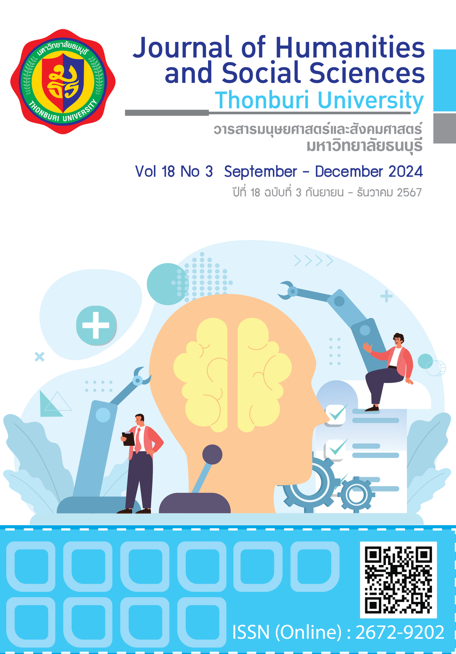Effects of Using Loose Part Play Activities on Social Relations of Young Children
Keywords:
Loose Parts Play, Social Relations, Young ChildrenAbstract
The aims of this study were twofold: 1) to juxtapose the social relations of young children prior to and subsequent to their engagement in loose parts play activities and 2) to scrutinize the varying degrees of social relation development among young children subsequent to their involvement in such activities. The study sample comprised 17 children in Kindergarten 2, aged between 4 and 5 years, selected from Bannaithung School in Nakhonsrithammarat Province, utilizing cluster random sampling. The experimental duration spanned a period of 8 weeks. The research instruments encompassed an activity plan for loose parts play activities along with a social relation assessment form. Data analysis was conducted utilizing mean, standard deviation, relative gain score formulas, and t-tests. The empirical findings revealed that: 1) children engaging in loose parts play activities exhibited significantly enhanced overall social relation scores post-intervention, with statistical significance set at .05; and 2) all participating children demonstrated heightened overall social relation development scores, with a predominant trend towards moderate-level development.
References
กมลวรรณ ศรีสาราญ และ อรพรรณ บุตรกตัญญู (2562). ผลการใช้กิจกรรมเล่นวัสดุสร้างสรรค์อย่างมีจุดมุ่งหมายที่มีต่อการตระหนักรู้และเข้าใจตนเองของเด็กปฐมวัย. จันทรเกษมสาร. 25(2): 33-47.
กระทรวงศึกษาธิการ. (2561). หลักสูตรการศึกษาเด็กปฐมวัย พุทธศักราช 2560. กรุงเทพฯ: โรงพิมพ์คุรุสภาลาดพร้าว.
กระทรวงสาธารณสุข. กรมอนามัย. (2565). คู่มือ ผู้อำนวยการเล่น (PLAY WORKER) เด็กไทยเล่นเปลี่ยนโลก. กรุงเทพฯ: สถาบันพัฒนาอนามัยแห่งชาติ กรมอนามัย กระทรวงสาธารณสุข.
กุลชาติ พันธุวรกุล. (2563). การจัดกิจกรรมศิลปะสร้างสรรค์ด้วยวัสดุเหลือใช้เพื่อส่งเสริมทักษะทางสังคมของเด็กวัยอนุบาล. วารสารครุศาสตร์สาร. 14(1): 130-145.
เทเรซ่า เคซีย์ และ จูเลียต โรเบิร์ตสัน. (2564). คู่มือการเล่นลูสพาร์ท ชิ้นส่วนเคลื่อนย้ายได้ [Loose Parts Play]
(เข็มพร วิรุณราพันธ์, พงศ์ปณต ดีคง และ ดร.นฤมล รื่นไวย์, แปล). กรุงเทพฯ: สำนักงานกองทุนสนับสนุนการสร้างเสริมสุขภาพ (สสส.).
บุญชม ศรีสะอาด. (2553). การวิจัยเบื้องต้น. พิมพ์ครั้งที่ 8. กรุงเทพฯ: สุวีริยาสาส์น.
ล้วน สายยศ และอังคณา สายยศ. (2553). เทคนิคการวิจัยทางการศึกษา. พิมพ์ครั้งที่ 11. กรุงเทพฯ: สุวีริยาสาส์น.
วรรณี แกมเกตุ. (2555). วิธีวิทยาการวิจัยทางพฤติกรรมศาสตร์. พิมพ์ครั้งที่ 3. กรุงเทพฯ: โรงพิมพ์แห่งจุฬาลงกรณ์มหาวิทยาลัย.
วิมลพรรณ สังข์สกุล, ปัทมา ผ่องศิริ, จรูญศรี มีหนองหว้า และวิภาวี พลแก้ว. (2564). สถานการณ์และแนวทางการส่งเสริมพัฒนาการเด็กปฐมวัยที่มุ่งเน้นผลลัพธ์. วารสารสุขภาพและการศึกษาพยาบาล. 27(1): 193-205.
ศิริชัย กาญจนวาสี. (2556). ทฤษฎีการทดสอบแบบดั้งเดิม. พิมพ์ครั้งที่ 7. โรงพิมพ์จุฬาลงกรณ์มหาวิทยาลัย.
ศิริวรรณ วณิชวัฒนวรชัย. (2559). การจัดการเรียนรู้ที่เน้นความแตกต่างระหว่างบุคคล. วารสารศึกษาศาสตร์ มหาวิทยาลัยศิลปากร. 13(2): 66-75.
สุรภา จิรโอฬารเมธ. (2564). ผลของการจัดกิจกรรมการเล่นกับชิ้นส่วนที่หลากหลายที่มีต่อความคิดสร้างสรรค์ของเด็กปฐมวัย. ศึกษาศาสตรมหาบัณฑิต, มหาวิทยาลัยศรีนครินทรวิโรฒ.
อรพรรณ บุตรกตัญญู. (2563). การเล่นวัสดุสร้างสรรค์. กรุงเทพฯ: มลูนิธิศักดิ์พรทรัพย์
Anna, P. (2019). Getting to grips with loose parts play. N.D.
Caldwell, J. (2016). Loose Parts. Reggio Inspired.
Gilman, S. (2018). The Arts, Loose Parts, and Conversations. Journal of the Canadian Association for Curriculum Studies (JCACS). 16: 90-103.
Hargraves, V. (2020). Materials for play Why open-ended loose parts are important. The Education Hub.
Macintyre, C. (2011). Enhancing Learning Through Play. 2nded. New York: Routledge Taylor & Francis Group.
Nicholoson, S. (2018). Simon Nicholson’s theory of loose parts. [online]: Simon Nicholson's theory of loose parts. Retrieved September 12, 2022, from http://louisapenfold.com
Nicholson, S. (1972). The Theory of Loose Parts, An important principle for design methodology. Studies in Design Education Craft & Technology. 4(2).
Wells, N. M., & Evans, G. (2003). Nearby Nature: A Buffer of Life Stress among Rural Children. Environment and Behavior, 35.
Butkatunyoo, Oraphan. (2020). Playing Creative Materials. Bangkok: Sakdibhornssup Foundation. (in Thai)
Casey, Theresa & Robertson, Juliet. (2021). Handbook of Loose Parts Play (Khemporn Wirunrapan, Pongpanott Deekong & Dr. Narumol Ruenwai, Translated) Bangkok: Thai Health Promotion Foundation. (in Thai)
Department of Health, Ministry of Public Health. (2022). Handbook of Play Worker, Thai Children Play Changes the World. Bangkok: Department of Health, Ministry of Public Health. (in Thai)
Jiraolarnmeth, Sulapha. (2021). The Effect of Using Loose Parts Activities on Creative Thinking of Young Children. Master of Education Thesis, Srinakharinwirot University. (in Thai)
Kaemkate, Wannee. (2012). Research Methodology in Behavioral Sciences. 3rded. Bangkok: Chulalongkorn University Printing House. (in Thai)
Kanjanawasee, Sirichai. (2013). Classical test theory. 7thed. Chulalongkorn University Printing House. (in Thai)
Ministry of Education. (2017). Early Childhood Education Curriculum in A.D. 2017. Bangkok: The Printing House of the Ladprao Teachers' Council. (in Thai)
Pantuworakul, Kullachat. (2020). An Organizing Creative Art Made from Wasted Material Activities to Enhance Kindergarteners’ Social Skills. Journal of Educational Studies. 14(1): 130-145. (in Thai)
Saiyos, Luan & Saiyos, Angkhana. (2010). Educational Research Techniques. 11thed. Bangkok: Suweerivasarn. (in Thai)
Srisamran, Kamonwan & Butkatunyoo, Oraphan. (2019). The Effects of Using Purposive Play Activities in Creative Materials on Self-awareness and Self-understanding of Young Children. Journal of Chandrakasemsarn. 25(2): 33-47. (in Thai)
Sungsakul, Wimonpan, Phongsiri, Pattama, Meenongwah, Jaroonsree, & Ponkaew, Wipawee. (2021). Situation and Outcome-Based Recommendations to Promote Early Childhood Development. Journal of Health and Nursing Education, 27(1). 193-205. (in Thai)
Srisa-Ard, Boonchom. (2010). Introduction to Research. 8thed. Bangkok: Suweerivasarn. (in Thai)
Vanichwatanavorachai, Siriwan. (2016). Differentiated Instruction. Journal of Education, Silpakorn University, 13(2): 66-75. (in Thai)
Downloads
Published
How to Cite
Issue
Section
License
Copyright (c) 2024 Kullachat Pantuworakul

This work is licensed under a Creative Commons Attribution-NonCommercial-NoDerivatives 4.0 International License.
ผลงานที่ปรากฎในวารสารฉบับนี้เป็นลิขสิทธิ์เฉพาะส่วนบุคคลของผู้เขียนซึ่งต้องรับผิดชอบต่อผลทาง กฎหมายที่อาจเกิดขึ้นได้และไม่มีผลต่อกองบรรณาธิการ






